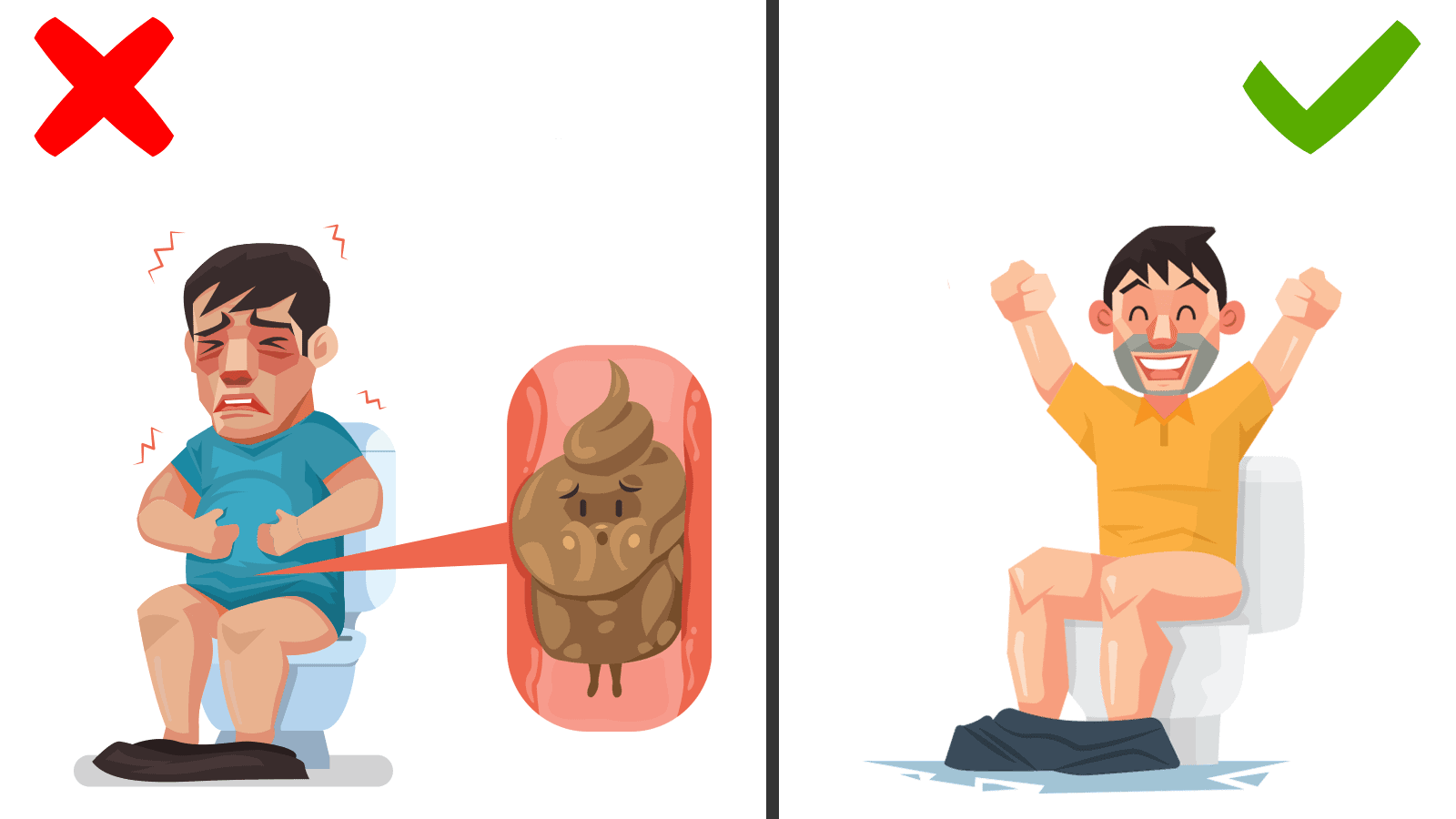Constipation is the inability to have a regular bowel movement, or B.M. Many people also (correctly) attribute a case of constipation to hardening of the feces.
“You’re looking a bit uptight. Are you constipated?” ~ Unknown
A person can suffer from acute (short-term) or chronic (long-term) constipation. The acute type often requires a trip to the doctor’s office. Acute constipation is abnormal, and a possible indicator of a severe underlying condition. Acute constipation in conjunction with other symptoms demands immediate medical attention. Such symptoms might include: abdominal pain and cramps, nausea, vomiting, rectal bleeding, and sudden loss of weight.

HOW OFTEN SHOULD I “GO”?
The “normal” frequency of bowel movements varies from person to person. Some people go up to three times or more per day. However, others may have a B.M. just a few times per week. There isn’t anything unhealthy about either scenario, by the way, as each person’s gut acts differently.
In most cases, a prolonged infrequency in bowel movements points to constipation. An absence of a B.M. lasting three days or more indicates that something’s probably amiss. Complications can arise as feces get harder during this period, which makes them progressively more difficult to pass.
HERE ARE SOME SYMPTOMS OF CONSTIPATION:
- Lower abdominal discomfort.
- Bloating.
- Hardened or small stools.
- Difficulty passing a B.M.
- Inability to pass most or all of your poop.
- Rectal bleeding.
SOME OF THE PRIMARY CATALYSTS OF CONSTIPATION INCLUDE:
- Stress (!).
- Being inactive/lack of exercise.
- Eating too much dairy.
- Not eating enough fiber.
- Excessive laxative intake.
- Dehydration.
- Eating disorders.
- Prescription medications.
- Use of certain antacids.
- Digestive system disorders.
- Neurological disorders.
- Hypothyroidism.
- Colon cancer.
- Pregnancy.
- Hormonal changes.
Natural treatments
In most cases, you don’t need a prescription to get relief. In fact, many doctors would first make sure you’re eating right and taking proper precautions. Without further ado:
HERE ARE FIVE NATURAL WAYS TO RELIEVE CONSTIPATION YOU MAY NOT HAVE HEARD ABOUT:
1. WATER WITH LEMON
As dry stool is the most common cause of constipation, staying hydrated can help prevent constipation. Liquid in your body will soften the stools and make them easier to pass. In some instances, however, water isn’t enough. Lemon juice works as a sort of “stimulant” for the digestive system and may help cure your constipation woes.
2. OILS
Many oils are effective in relieving constipation. Fish oil, or omega-3s, may help aid digestion. In fact, omegas benefit just about every area of the body. If you’re not getting fish oil directly from foods, ensure that you pick a high-quality supplement.
Castor oil is also an age-old cure that is both quick and effective. Mineral oil serves as another good option for getting your bowels back in shape.
3. MAGNESIUM
Magnesium is a miracle nutrient/supplement. Believe it or not, “Mg” is involved in over 300 processes in the body, including (you guessed it!) digestion. Upwards of 80 percent of people facing long-term bowel troubles do not get enough magnesium in their diet.
You can get magnesium in whole grains, almonds, legumes, and green leafy vegetables. High-quality magnesium supplements are also available.
4. HERBS AND PLANTS
(Note: if you have been diagnosed with a medical condition or are taking prescription medication, please contact your primary wellness professional before consuming herbs.)
Herbs and plant-based treatments may be a smart choice for people who suffer from problematic constipation. In most cases, one or more of the other treatments recommended here will suffice. With this in mind, here are a few popular and effective herbal supplements for alleviating constipation:
- Aloe
- Barley
- Flaxseed
- Fenugreek
- Senna
5. QUALITY FIBER
Last but certainly not least is high-quality fiber. Fiber is highly effective against constipation. As such, it brings relief to many. Experts recommend that men get about 38 grams of fiber per day. Women require substantially less, at around 25 grams.
While fiber is a terrific antidote for constipation, it doesn’t work if you are not hydrated. So make sure that you’re drinking a minimum of eight, 8-ounce glasses of water daily. If you’re constipated, it is likely a good idea to increase your water intake.
FINAL THOUGHTS: DON’T IGNORE YOUR GUT
Talking about stomach problems is still considered kind of taboo. Many people gloss over discussing digestive problems with their doctor out of fear of embarrassment, which is a mistake.
Problems of the gastrointestinal (GI) tract are nothing to be ashamed of or to avoid discussing. Gut troubles can quickly escalate into more severe and potentially even life-threatening conditions. If needed, it is paramount that you seek medical care.
If you are embarrassed about your gut troubles, take comfort in knowing that most people have them at some point. In the eyes of healthcare professionals, your gut troubles are neither unique or a cause for embarrassment.
They’ve pretty much seen it all, folks!

No comments:
Post a Comment